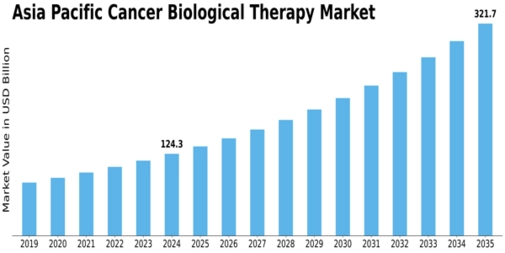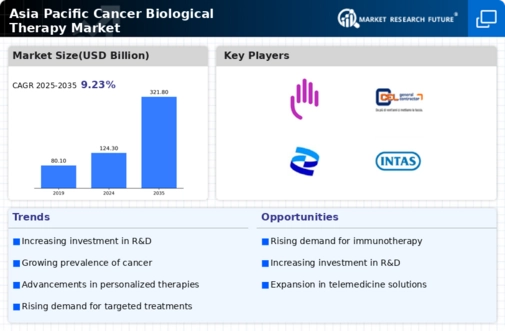Apac Cancer Biological Therapy Size
APAC Cancer Biological Therapy Market Growth Projections and Opportunities
The global market for cancer biological therapy is influenced by various factors that shape its dynamics and growth trends as well. One of the main drivers of this market is the growing incidence of cancer globally, due to the aging world population and changing lifestyles which have resulted in an increased demand for effective treatment options designed specifically for targeted application against cancer cells with minimal effects on other normal tissues.
At the same time, progressive developments in biotechnology and knowledge about cancer biology are crucial to the structure of this market. Prolonged research activities lead to novel therapeutic targets being identified and new biological agents developed. A constant stream of new therapies better than their predecessors only results in an improved treatment landscape making it more diverse with more types of cancers treated at once.
The Cancer Biological Therapy market is also subject to significant regulatory influences. Stringent regulatory frameworks set by health authorities worldwide govern the approval and commercialization of biological therapies. The approval process involves rigorous scrutiny of safety and efficacy data, meaning that failure to meet these requirements may lead to denial of market entry. It thus follows that any changes made in regulation guidelines can affect development and commercialization processes required for new biological treatments.
Market competition also contributes majorly towards shaping the dynamics within the Cancer Biological Therapy industry. Intense competition among pharmaceuticals companies with a number engaged into research and development has led to continuous efforts geared towards developing most effective drugs ever seen before. Clinical trials, product development as well as strategic collaborations receive heavy investments from businesses seeking a competitive edge over their rivals. This aspect not only encourages innovation but also affects pricing strategies, market share as well as overall availability or accessibility of such treatments.
Moreover, economic conditions within different regions together with healthcare infrastructures contribute much into Cancer Biological Therapy’s markets dynamics. Economic indicators like; patient affordability, reimbursement policies or even health care spending leads to difference in accessibility levels for these treatments across people who suffer from this particular disease condition. Availability of health care resources between underdeveloped and developing countries may lead to the different installation rates thus causing regional discrepancies in terms of market growth.
The market for Cancer Biological Therapy is also influenced by technological advancements. Next-generation sequencing and personalized medicine are some of the latest technologies being used which allows an understanding that is more accurate about individual patients. This is what will facilitate the emergence of personalized biological therapies or targeted treatment options. The fusion of technology into cancer biology and therapy has continued to diversify treatment alternatives while expanding this market at large.”








Leave a Comment